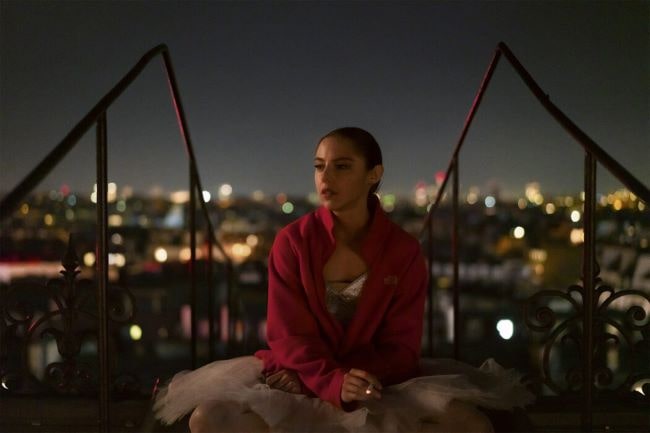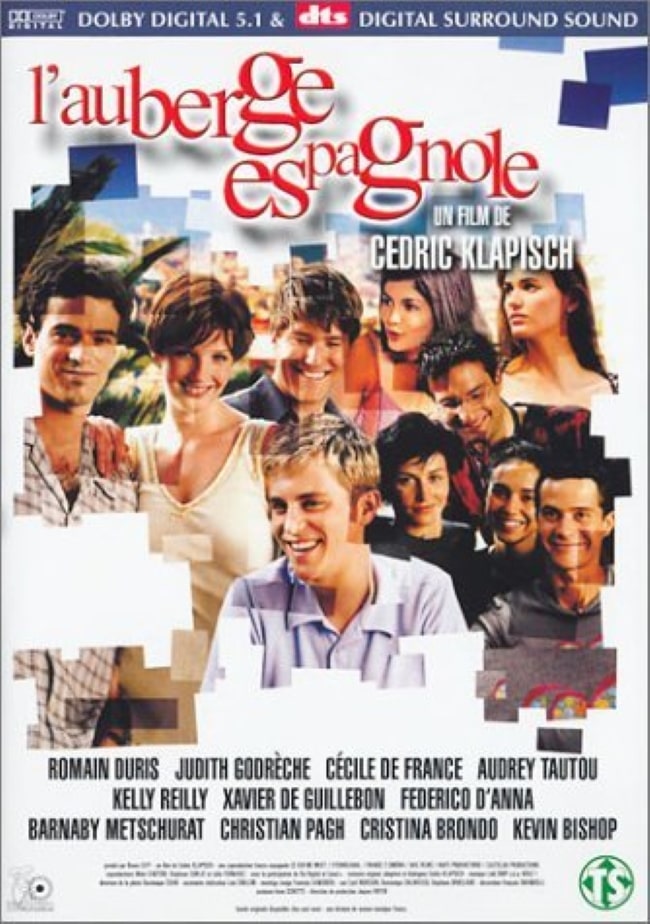Film Review: En Corps
- SUBSCRIBE
- ALREADY SUBSCRIBED?
BECOME A BONJOUR PARIS MEMBER
Gain full access to our collection of over 5,000 articles and bring the City of Light into your life. Just 60 USD per year.
Find out why you should become a member here.
Sign in
Fill in your credentials below.
It’s been said that film is the ideal medium for capturing the sensual, kinetic quality of dance. Cédric Klapisch’s En Corps would seem to confirm that. Klapisch, one of France’s top directors (L’Auberge Espagnol, Deux Moi, Paris), possesses effortless mastery in both camera-work and editing, and when he films dancers he might be one of their partners. Even we theater-seat potatoes feel the exhilaration of bodies in joyful movement, sensuous interaction, painful accident — just plain life. If it’s one of those proverbial cases of the parts not quite adding up to a successful whole, still what pleasurable parts!
En Corps is the story of Elise Gautier (Marion Barbeau), a young ballerina (actually, in her milieu she’s a mature woman of 26). At the top of her form, Elise has beauty, poise, control over her technique. She’s completely at home at the historical Opera Garnier, its mazelike backstage spaces, throngs of personnel, equipment sprouting as if in a mechanical jungle. But she’s also an emotional being, and when emotion gets the better of her she has an accident that may spell the end of her career.

Opera Garnier grand staircase © Benh Lieu Song
Elise is distraught, though not bitter, determined to go on with her life. Although Ms. Barbeau’s emotional register sometimes seems one-note, you can’t help being taken by her vivaciousness, and at the same time by her solidity: she’s someone with a grip on her emotional, as well as physical, center of gravity.
The folks around her aren’t much help. Her lawyer father (Denis Podalydes) wants her to take up law, pointing out that even in the best case her body will give out one day. Her doctor is pessimistic about her dancing at all. Her physiotherapist, who happens to be her ex-boyfriend, is more concerned with his own emotional well-being.
A Hollywood star vehicle might embark on a grimly uplifting comeback story, full of painful exertion, nervous breakdowns, a hunky (but soulful) love interest. The reason I’m a fan of Cedric Klapisch is his human comedy approach to movies, specializing in how life can go (usually gently) off the rails. When that happens, life also results in a “situation”, as in sit-com, but much more than that. People who wouldn’t have met or known each other are thrown together as compagnons de route or lovers. And so, Elise goes on a surprising (it shouldn’t be, given that this is a Klapisch movie) picaresque voyage to recovery — and discovery.
The rigors of ballet being out of reach, Elise discovers contemporary dance. It’s not clear why this kind of dance should be less strenuous than ballet. Some of what we see does correspond to the stereotype of experimental dance as merely funny (but hopefully expressive) gesturing. But other scenes show movements (some derived from acrobatic break dancing) as rigorous as anything in classical dance.
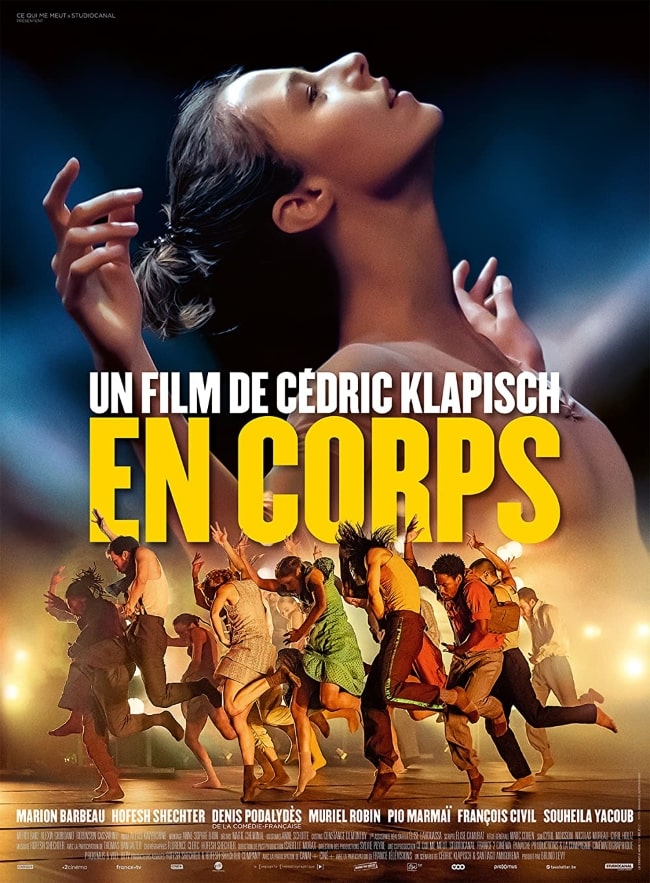
Poster of En Corps from IMDB
She decides to join a troupe at an arts camp along the wild shores of Brittany. At first she works for the kitchen staff serving the artists at the camp. But she gets invited to take part in rehearsals, where she discovers more than a new kind of dance. The performance sequences are superlative, in the tradition of Fame, Glee, and all those You’ve Got Talent-type television shows. After a while, though, they come to resemble NFL highlights videos — exciting for sure, but we want not just the sizzle but the steak, and we discover something ourselves: We want to be there live, where somehow we’re part of the action. We also want to experience a choreographer’s creation in its entirety, to get the shape of it, and its point (if any).
As the movie goes from one situation and character and place to another, like a dancer moving around the stage, I noticed a resemblance to a completely different work: Nomadland. Woman loses job, goes in search of a way to survive, finds a bucolic alternative, meets male guru, also female guru, also new lover, basks in scenery, reconnects with family. I’m not implying that Klapisch was inspired by that cheesy Oscar-winner, only that he’s left, at least to a degree, the open road of human comedy for a more formulaic feel-good route.
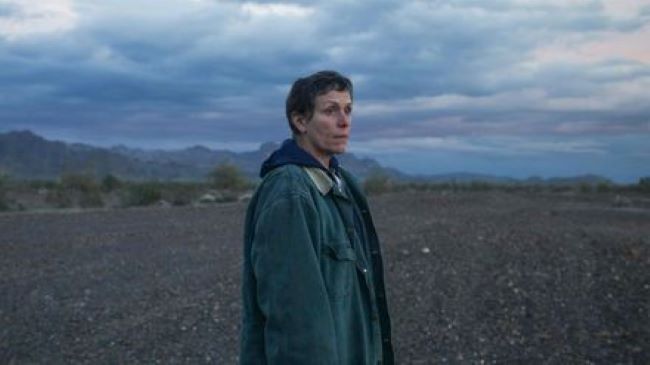
A still of Nomadland from the film trailer
What saves En Corps is the interest of the theme — or themes — evoked by the title. For it’s a triple play on words. Encore, as in the celebratory vibe of a great performance, when both audience and performers want more, more, more. But also as in “What do you do for an encore?” when you’re done with one phase of your life. It doesn’t seem much of an issue with a 26-year-old, but in France young people are often permanently set on a particular pathway from without (e.g. the school system) and within. Self-reinvention is still a big deal here. En Corps is also literally “In the body”, and the film is fascinating depicting people who are utterly immersed in the physical. But I eventually wondered if the characters might also have a mind, political ideas, spiritual ideas, or any ideas.
En Corps is also (I guess it’s a quadruple play on words) “in a corps” as in a group, here mostly ballet or dance troupes. Elise always seems to be in some group (including the kitchen staff). This corresponds to Klapisch’s comic interest in putting people together, mixing them up, and enjoying the unexpected but invariably happy results. It also corresponds to his expert direction of ensemble casts.
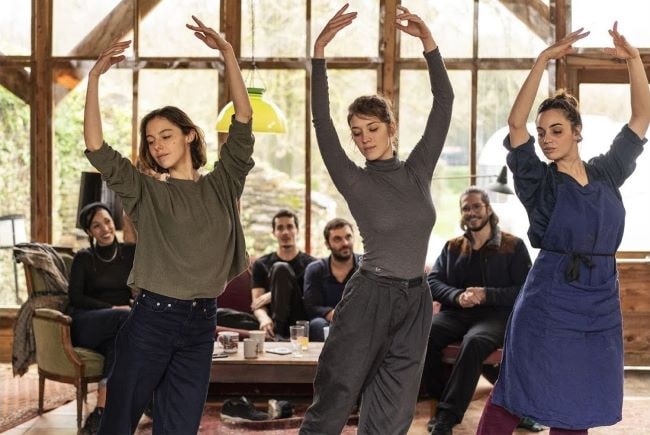
A still of a dancing scene in En Corps © Studiocanal at Youtube
Aside from the dance sequences, the chief pleasure of the movie is watching our heroine interact with characters in these groups. It’s balletic but also, as ballet more rarely is, comic as well as poignant. Podalydes is sublime as the baffled but wilfully oblivious father of Elise and two other daughters. Muriel Robin, a long-time stand-up personality, is crusty and warm as Elise’s guide at the arts camp. Hofesh Shechter (a real-life choreographer) as the leader of the troupe and Mehdi Baki as the dancer who becomes Elise’s lover, go through their emotional paces efficiently, but not much more than that. More entertaining is François Civil as Yann, the sports PT and ex-boyfriend. Enthusiastic even when clueless, self-pitying, self-absorbed, he’s an irritating bit of sand in the oyster who, frankly, irritated the hell out of me, but plays an undeniable role in turning Elise into a lustrous pearl.
Production: Ce qui me meut/Studiocanal/France 2 Cinéma
Distribution: Studiocanal
Lead photo credit : A still of Elise Gautier in En Corps © Studio Canal at Youtube
More in ballet, Cedric Klapisch, dance, En corps, film review, Opera Garnier
